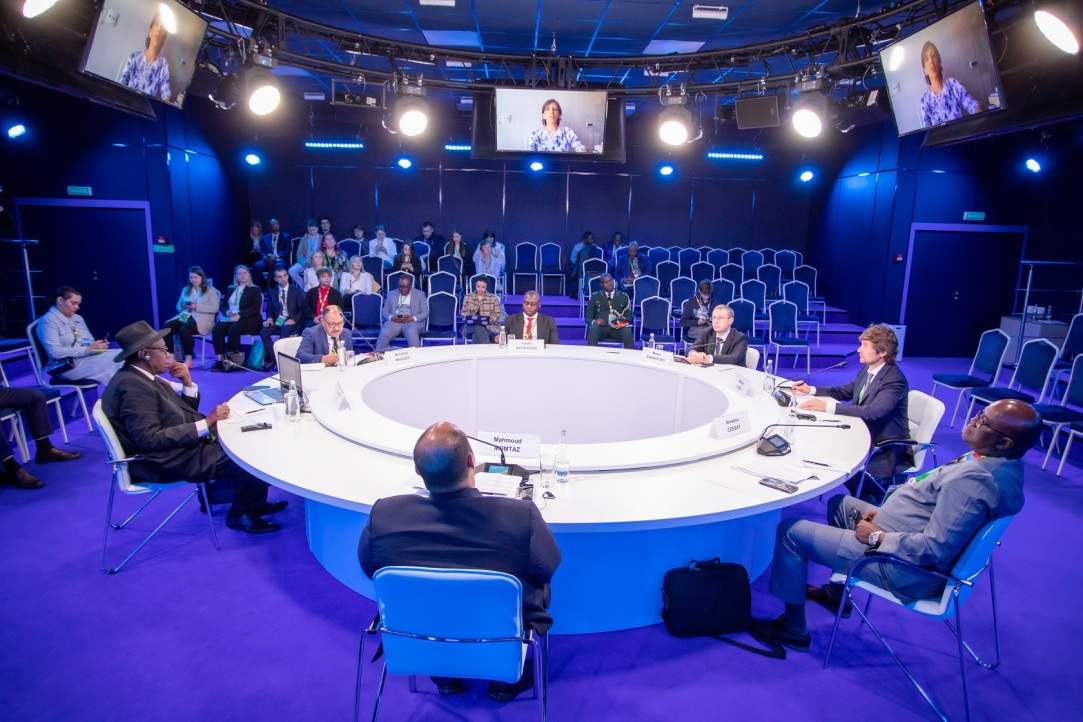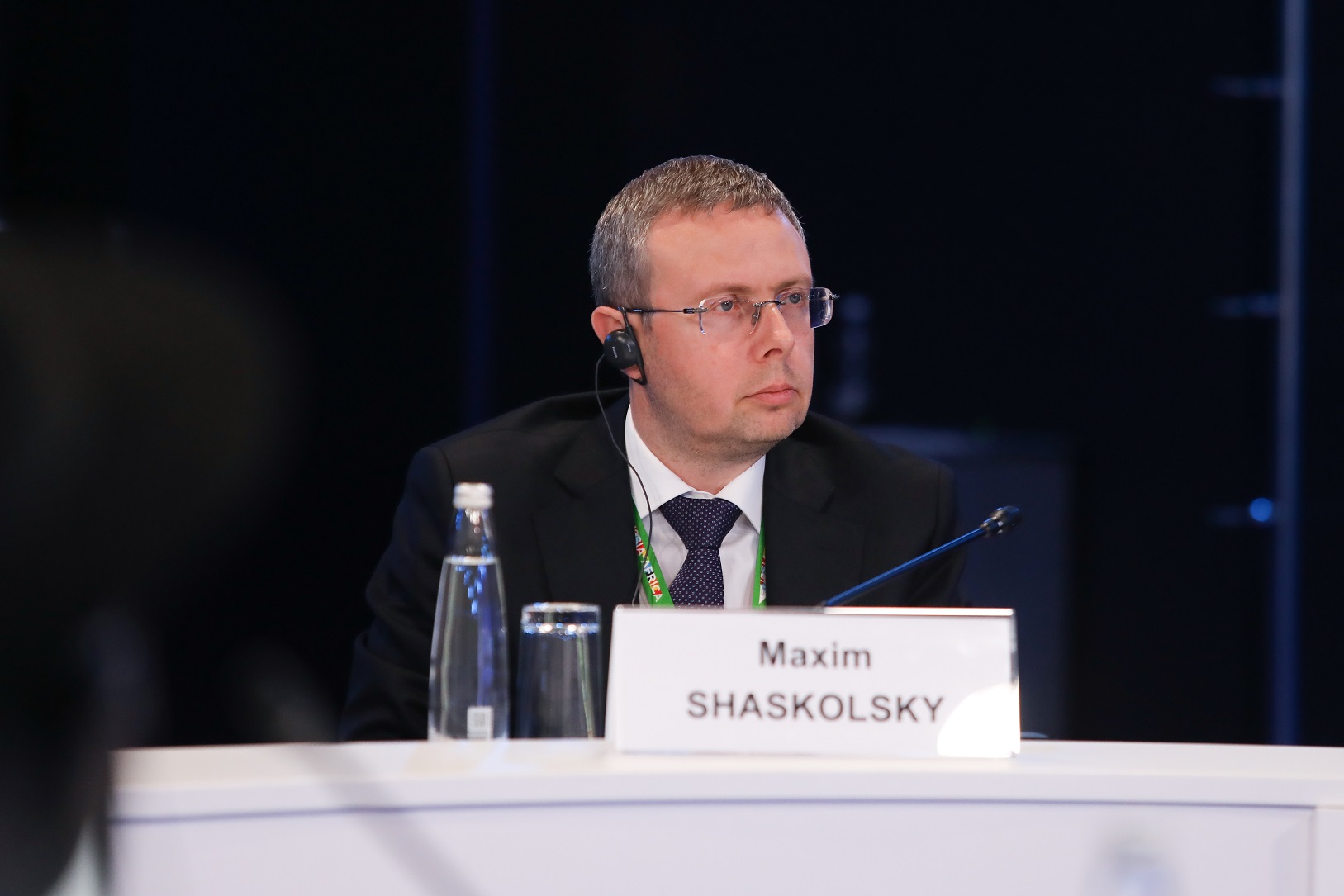‘The BRICS Centre will Help Transfer Best Practices in Antitrust Regulation to Africa’

At the Russia-Africa Forum held last week, HSE University’s International BRICS Competition Law and Policy Centre, in collaboration with the Federal Antimonopoly Service of Russia, organised a discussion on ‘The Fight against Anticompetitive Practices of Large TNCs, Cross-Border Cartel Combatting, and International Cooperation.’
The heads of antitrust agencies from Egypt, South Africa, Tunisia, Gambia, and Chad participated in the event. Maxim Shaskolsky, Head of the Federal Antimonopoly Service of Russia, was the key speaker. The session was moderated by Alexey Ivanov, Director of the International BRICS Competition Law and Policy Centre.
While focusing on the problems of national economies, Russian and African antitrust authorities should not overlook the issue of anticompetitive behaviour by global players, stated Alexey Ivanov. The restrictive business practices of large transnational corporations have an adverse impact on international trade, particularly on the trade and growth potential of developing economies, and diminish the effectiveness of national antitrust regulation. Working out a response to the actions of large TNCs is possible only through active interaction between the competition authorities of different countries. Russia is already working with many African countries within the frameworks of BRICS, BRICS+, and the United Nations, including UNCTAD (United Nations Conference on Trade and Development).

‘The reformatting of global markets and trade channels in all sectors of the world economy—from the food industry to the circulation of data on digital platforms and financial services—sharply raises the question of protecting competition and preventing monopolisation, various forms of misuse, cartelisation, etc; in other words, everything that hinders the normal processes of economic development and healthy social relations. The tools of antimonopoly law are undeservedly forgotten and marginalised. Cooperation with Africa plays a key role in this matter, as it is the largest growing economy—probably one of the few regions in the world that still has everything ahead of it. It is precisely at this stage that we need to lay the foundations for a fair, honest, competitive economic order and slow down the processes of monopolisation and digital colonisation of Africa. The BRICS Centre will help transfer best practices in antitrust regulation to Africa,’ emphasised Alexey Ivanov.

In order to effectively combat cross-border anticompetitive practices, it is also necessary to expand international cooperation.
‘Interaction with foreign partners allows us to exchange experience and practices, gain access to missing information available to other jurisdictions, see the global nature of offense, optimise resource utilisation, and avoid asymmetry in decision-making and instructions,’ said Maxim Shaskolsky, Head of the Federal Antimonopoly Service.
Teresa Moreira, Head of the Competition and Consumer Policies Branch of UNCTAD, spoke about work to develop international cooperation within UNCTAD. Competition and consumer protection issues have been at the centre of UNCTAD’s attention since the 1980s, when The Set of Multilaterally Agreed Equitable Principles and Rules for the Control Restrictive Business Practices was adopted. A memorandum of understanding was signed between UNCTAD and the International BRICS Competition Law and Policy Centre.

‘Our priority is to help developing countries better integrate into the global economy through effective competition law enforcement and еру dissemination of best regulatory practices within their national laws,’ she said.
UNCTAD pays special attention to the working group on section F of The Set of Equitable Principles and Rules for the Control of Restrictive Business Practices of the United Nations, the speaker emphasised. The joint work of regulators, including work at the regional level, is important.
‘At the regional level, it is always easier to gather the necessary resources and a pool of experts in order to exchange experience, knowledge and even launch joint investigations. In our opinion, this is a great way for antitrust authorities to compensate for the lack of resources and support colleagues with less experience in this area,’ said Teresa Moreira.
Mahmoud Momtaz, Chairman of the Egyptian Competition Authority (ECA), stressed that the issues of information sharing, coordination of investigations, harmonisation of competition laws and capacity building of regulators go far beyond regional organisations. In 2021, the volume of trade between African countries and Russia amounted to about 15.6 billion USD. Given the number of countries involved in the trade process, competition practices in the global context play an important role. In addition, it is necessary to take into account the growth in population and industrial production on the African continent, as well as the factor of digitalisation.

‘In the context of global digitalisation, the competition protection practices that we use are changing, which means that corresponding changes in antitrust laws should also take place. I am convinced that it is extremely important to pay attention to cooperation at all levels and improve the mechanisms of antimonopoly policy,’ Mahmoud Momtaz emphasised.

Amadou Ceesay, Executive Secretary of the Gambia Competition and Consumer Commission (GCCPC), said that while the Gambia is a small country, it is an important player in the region and the Gambia Competition Authority is engaged in international competition enforcement cooperation. The African Competition Forum in 2023 will be held in the Gambia.
Hardin Ratshisusu, Deputy Commissioner of the Competition Commission of the Republic of South Africa, believes that any competition authority should consider international cooperation to be its priority and deal with global cases, because the negative effects of monopolisation hinder economic growth. There is a need to constantly monitor the practices of global companies.

Today, 29 countries on the African continent have antitrust laws. In addition, there are four regional economic associations in Africa with related competition legislation. ‘This suggests that the African continent is developing and moving towards building a system of clear rules for the protection of competition,’ said Hardin Ratshisusu. According to him, the Competition Commission of South Africa has already concluded a number of memorandums of understanding—both within the BRICS framework and with individual neighbouring countries in the region. ‘Trust is extremely important, and it is built on personal interaction: we can share important information and trust partners from other countries,’ he stressed. He also believes that it is possible to create a single competition agency that would work throughout the African continent.
Summing up the session, Maxim Shaskolsky said that although the competition authorities of the BRICS countries and the African continent have different capabilities, resources, and status, the challenges and tasks they face are similar. ‘We plan to develop cooperation in a bilateral, multilateral format through international organisations, exchange experience and information. This way, we will establish interaction and build the trust that my colleagues spoke about today.’
See also:
HSE University Holds HSE CS × BRICS Ideathon
On November 9, 2025, the HSE CS × BRICS Ideathon—a large-scale intensive event for students aimed at developing international project skills and finding solutions to current challenges facing BRICS countries—took place at HSE University’s Pokrovsky Bulvar campus. The event was organised by the Multilateral Strategic Projects Office with the support of the BRICS Expert Council–Russia , the Faculty of Computer Science (FCS), and the HSE FCS Hackathon Club
‘To Help Make the World More Sustainable, Fair, and Humane’
The BRICS International School: New Generation has concluded at HSE University, bringing together more than 100 participants from 38 BRICS and Global South countries. The attendees included early-career researchers, diplomats, entrepreneurs, journalists, and civil society representatives.
‘Regulators Must Understand That Absolute Predictability is Unattainable’
On October 10–11, 2025, the BRICS Competition Law and Policy Centre at HSE University (the BRICS Centre) hosted a two-day international seminar, ‘Platform Economy: Competition Law and the Market Power of Digital Platforms,’ in Tashkent, Uzbekistan. The event brought together competition authorities from BRICS+ nations and leading antitrust experts from around the world.
Achieving Financial Independence: Experts Discuss Development of BRICS National Currency Settlements
How can BRICS countries move away from the dollar in international settlements, and what can they do to advance this goal today? These questions were discussed by experts during a round table at HSE University. The event was organised by the Multilateral Strategic Projects Office together with the HSE Faculty of World Economy and International Affairs as part of HSE’s activities within the BRICS Network University and the Joint Basic Research Projects ‘International Academic Cooperation of HSE University.’
Experts from HSE University and BRICS Anti-Monopoly Authorities Analyse Global Grain Market
The International BRICS Competition Law and Policy Centre at HSE University presented the scientific report ‘From Fields to Futures: Competition, Financialisation, and Digitalisation in Global Grain Value Chains.’ The document was prepared as part of expert support from the BRICS Working Group on Competition Research in Food Markets. The presentation took place at the academic conference ‘Emerging Challenges of Competition Law and Policy in the BRICS and Beyond’ on September 12, 2025, in Cape Town (South Africa), which the BRICS Centre organised together with the University of Cape Town on the sidelines of the 9th BRICS International Competition Conference.
HSE Launches Training for Future BRICS Experts
From August 20–23, 2025, the Artek International Children’s Centre (Crimea, Russia) hosted an off-site session of HSE University’s educational and outreach project BRICS International School: New Generation. The school was the first event to take place under the cooperation agreement signed this year between HSE University and Artek.
HSE University and University of Campinas Join Forces to Build Alternative Financial System
HSE University and the University of Campinas (UNICAMP, Brazil) have announced the launch of a major joint research project to develop new approaches to an alternative international financial system. The initiative, which brings together leading experts in global economics and finance, seeks to analyse the current state of international financial architecture and explore ways of transforming it in the context of a changing geopolitical landscape.
HSE University to Host BRICS International School: New Generation
Registration for the BRICS International School: New Generation, one of the leading international educational projects aimed at prospective leaders interested in the agenda of global development and cooperation within the framework of BRICS, has opened.
Experts Assess How BRICS Countries’ Education Systems Are Evolving
The BRICS Expert Council–Russia, based at HSE University and operating in collaboration with the HSE Institute of Education, has released an analytical report titled ‘The Transformation of General Education in BRICS Countries.’ The study explores how BRICS nations are addressing shared challenges, including equitable access to schooling, digital integration, support for inclusion, linguistic diversity, and intercultural dialogue.
‘Artificial Intelligence Has Become the Lifeblood of the Global Economy’
Experts from HSE University took part in the BRICS Academic Forum (FABRICS) held in the capital of Brazil this year. The main theme of the event was to discuss cooperation among countries in the Global South amid geopolitical turbulence and rapid technological change. Academics and experts from BRICS member states and partner nations explored topics such as global healthcare, AI technologies, trade, climate change, and reform of the multilateral global security and governance architecture.


